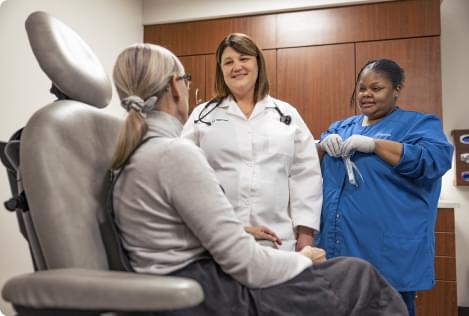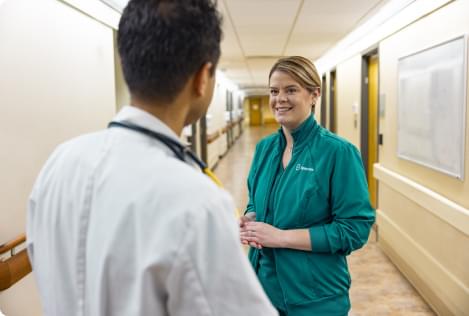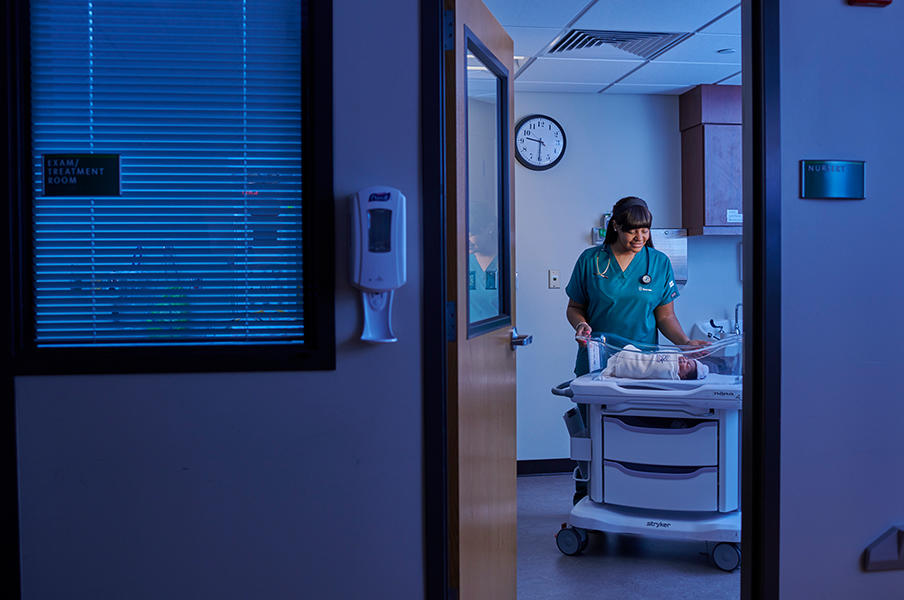When will my baby be ready to come home?
Your baby's physician will ultimately decide when a baby is ready to be discharged. Some of the factors taken into consideration are:
- Baby's medical condition and vital signs are consistently stable
- He/she is able to nipple all feedings in about 20 minutes or less without difficulty
- Baby is steadily gaining weight
- Baby is able to maintain his/her temperature in an open crib
- Baby has been free of "events" such as apneas, bradycardias or desaturations for at least +/- 5 days prior to going home
- Baby's hearing screen is completed
- Family and home are ready for the baby
- Immunization permits are signed, and immunizations are given, as appropriate
- Circumcision permit is signed and the circumcision is done, if applicable
- Baby has an appointment with a pediatrician/doctor within 24-72 hours after discharge
- Baby pictures are taken, if desired
- Developmental Assessment Clinic (DAC) video is watched and a DAC appointment is made for babies 32 weeks gestation or less
- Family has taken an infant CPR class offered in the unit
Am I ready for my baby to come home?
- Am I comfortable with breastfeeding and/or familiar with the preparation of formula?
- Have I changed my baby's diaper, done cord care, given his/her bath, know how to take my baby's temperature, and feel comfortable with my baby's overall care?
- Have I signed up for and completed my CPR class?
- Have I been taught how to give my baby's medications and the purpose of these medications? Do I have my medication prescriptions filled?
- Have I chosen a pediatrician/doctor for my baby, and have I made an appointment for 24-72 hours after discharge?
- Do I have all my primary care physician/specialist appointments set?
- Have all of my questions about my baby's care at home been answered?
- Am I ready with the supplies at home that I need to care for my baby?
- Do I have a car seat and know how to use it correctly?
- Do I understand the ways to decrease the chance of my baby getting an infection, such as good hand washing by everyone in contact with the baby, limiting visitors, and staying away from anyone who is sick and large crowds at places like grocery stores and church nurseries?
- Do I understand the SIDS information and ways to decrease my baby's chance for SIDS, such as no smoking around the baby, positioning the baby on his/her side or back, and dressing the baby appropriately for the home or outside?
- Have I made preparations for a complete smoke-free home environment?
Things your baby will need
Guidelines for the supplies your baby will need at home:
- 5-7 undershirts
- 3-8 nightgowns with elastic or drawstring bottoms
- 2-3 blanket sleepers
- 5-7 pairs of socks
- 2-4 washable bibs
- sweater
- hat
- bunting or snowsuit bag (seasonal - be sure it is compatible with car seat)
- 3-4 blankets
- 1-2 bath towels (towels with hoods are convenient)
- 4-6 washcloths
- diapers
- 5-7 burp cloths (cloth diapers work well)
- 2 fitted crib sheets
- waterproof mattress pad
Other supplies
- baby soap/no-tears baby shampoo
- diaper rash ointment
- diaper wipes
- baby nail scissors or clippers
- Infant Tylenol
- Infant Motrin
- thermometer
- bulb syringe
- 4 bottles, 4-ounce size, with nipples
- 10-12 bottles, 8-ounce size, with nipples
Furnishings
- crib or bassinet/cradle
- baby tub or bath sponge
- infant car seat
Useful services you may qualify for
For more information or to apply for any of these services or benefits, contact your NICU social worker or directly contact the agencies.
Supplemental Security Income (SSI)
A program that pays monthly benefits to people with low income and limited assets who are 65 or older, blind or disabled. Children may qualify if they meet Social Security's definition of disability and their income and assets fall within the eligibility limits. When a child is living at home, the parents' income and assets are considered in deeming if the child qualifies.
Children can be considered "disabled" for SSI purposes if their impairment affects their ability to do things and behave as other children of a similar age. Certain medical conditions can presume the child to be eligible, e.g., Down Syndrome, blindness, extreme low birth weight, etc. Eligibility for SSI benefits begins when Social Security receives a notice of intent to file a claim. Social Security does not accept retroactive SSI applications. For more information about SSI, call the Social Security Administrator at 1.800.772.1213. Within Ingham County, call 517.393.3876.
Children's Special Health Care Services (CSHCS)
A program that pays for certain specialized medical treatment, equipment and supplies. To qualify for services, an individual must have a medically eligible condition and be under 21 years of age. Those over 21 with cystic fibrosis or certain coagulation defects (e.g., hemophilia) may also be eligible for services.
Families of all income levels are eligible to enroll in the CSHCS program. Some families may be fully covered for services and others are required to share in the cost of their child's care through a client payment agreement. For more information, call Children's Special Health Care Services at 1.800.359.3722. Ingham County residents can call 517.887.4309.
Early On School Program
Coordinated, family-centered early intervention services to facilitate a child's development from birth to three years of age and enhance the family's capacity to support the child's development. To be eligible, a child must have a developmental delay or a physical or mental condition likely to lead to a delay.
Referrals to the Early On Program can be initiated through Public Health, Education, Mental Health or the Family Independence Agency. After a referral is made, the Early On staff completes an evaluation to determine eligibility. If your child is eligible, the Early On staff will work with you to develop an Individualized Family Service Plan that refers you to and/or provides early intervention services as needed. For more information or if you have concerns about your child's development, call 1.800.Early On 1.800.327.5966).
Medicaid
Medicaid is a health insurance program for people with low income and limited assets. In Michigan, children receiving SSI benefits qualify for Medicaid coverage. Some children qualify for Medicaid coverage even if they do not qualify for SSI. When a child is living at home, parental income and assets are considered in determining qualification. Children hospitalized for 30 or more days can qualify for Medicaid regardless of parental income or assets.
For more information about the Medicaid program, call the Family Independence Agency (FIA) in your county. To find out the telephone number of your county's FIA office, call 517.373.0707. Ingham County residents can call 517.887.9400.
If you already have Medicaid, please contact your FIA worker to add your baby. If you have medical insurance through your employer, please remember to add your baby to your medical insurance policy. Many employers require babies be added within 30 days of birth.
WIC
Women, Infants and Children (WIC) is a federal nutrition and health program for pregnant, breast feeding and postpartum women, and infants and children up to 5 years of age, from low- to middle-income households and determined to be at nutritional or health risk. If eligible, participants receive coupons to buy milk, cheese, eggs, juices, cereals, peas or beans, peanut butter, formula, infant cereal or infant juice. In Michigan, WIC is administered through the Michigan Department of Community Health. Participants must be Michigan residents. For more information about the WIC program, call 1.800.26.BIRTH.
Public Health Nurses
These nurses provide education, counseling, information and referral services for infant care, health problems, growth and development, lifestyle adaptations, nutrition, chronic disease and other challenges. Services are available to Ingham county residents. For more information about public health nursing, call your local health department. Ingham County residents can call 517.887.4322.



